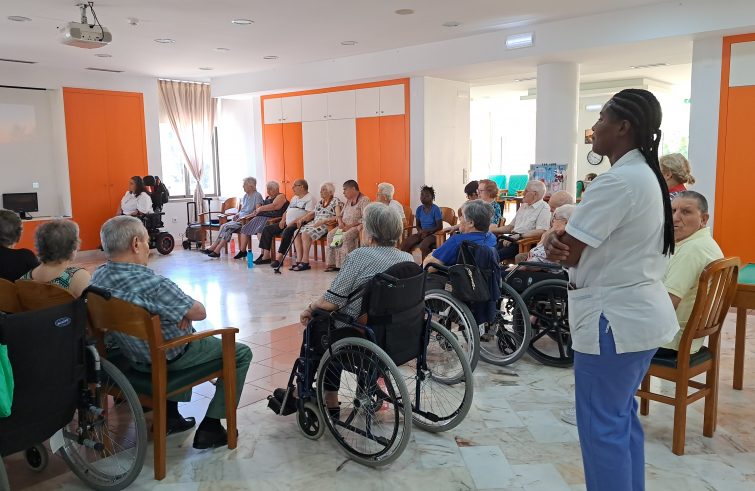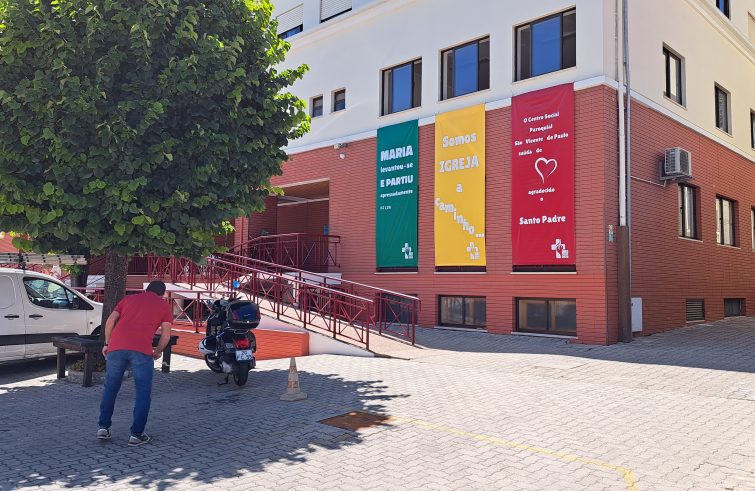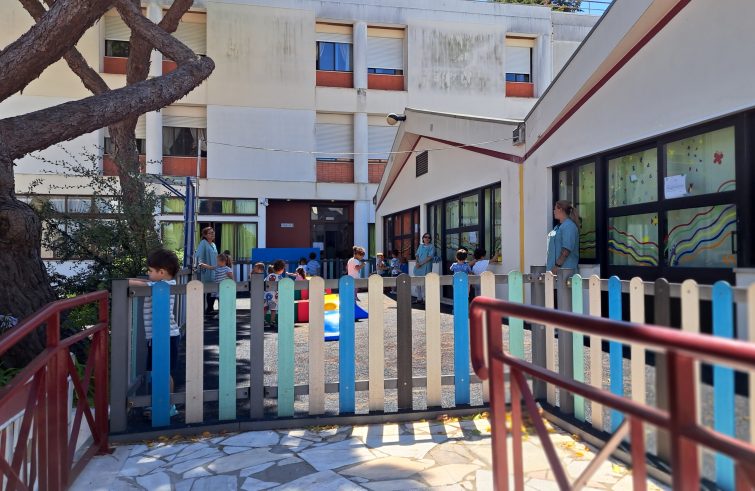
(from Lisbon) “We have managed to achieve all of this in the last 45 years. When I arrived here for the first time, there was nothing. There were shacks, old and sick people dying in their homes, alone and without care. The church was the last building that I had built. These people needed a charitable response.” Father Francisco Crespo will be welcoming Pope Francis on Friday 4 August, first at the Centro Social Paroquial São Vicente de Paulo, where the Pope will meet a first group of about 200 people representing several charitable institutions of the city in the auditorium, and then another 400 in the adjacent parish. The Pope has asked to visit a church in the suburbs and to include a meeting with charities in the agenda of his visit to Lisbon. “He will be here”, says Father Francisco, visibly moved.
 Bairro da Serafina. This is one of Lisbon’s most deprived suburbs. Father Francisco is now 82 years old. As a young man he received his formation as a Consolata missionary in Turin. He lived in Fatima for a short time and then moved to Lisbon. “I found the mission here,” he says, “in the suburbs of this city, and I decided to stay.
Bairro da Serafina. This is one of Lisbon’s most deprived suburbs. Father Francisco is now 82 years old. As a young man he received his formation as a Consolata missionary in Turin. He lived in Fatima for a short time and then moved to Lisbon. “I found the mission here,” he says, “in the suburbs of this city, and I decided to stay.
The Centre’s motto is: ‘Charity is evangelization’, and its members try to put into practice ‘day after day’ the teaching of St Vincent de Paul, embodied in the call to “love God in the poor.”
“Whether people came to the church to pray or attend Mass was not my primary concern,” Father Crespo said. “I knew there were people out there who needed to be fed and cared for. We started with them.”
 Over the years, the precarious shelters have been gradually replaced by new buildings and facilities to meet the needs of the local community. The Centre currently provides day care for 60 elderly people, home care for a further 80 and accommodation for 120 dependent persons. In a large room next door, behind a glass window, a group of elderly people can be heard applauding and singing. But there are also disabled adults in the corridors, “the vast majority of whom have no family support.” Young people are repairing a fountain in preparation for the Pope’s visit, while workers are putting the finishing touches to the platforms that will allow the Holy Father to pass safely in his wheelchair. A group of children play in a neighbouring building, while the youth Centre is just a few steps away. “We have developed various activities especially for these young people, to get them off the streets and out of the dangerous situations that the streets often bring. The peculiarity of the Centre – the priest remarks – is that it was born in the heart of a community. “It is the product of a parish that has not closed in on itself, but has taken the needs of the people and tried to respond to them. Are you hungry? There is food here. Do you need a doctor? Here you will find medical personnel. Need a job? We will help you find one.” The numbers are impressive. The Centre now cares for and welcomes 900 people and serves 1,200 meals a day. A total of 170 people work here, including doctors, nurses, physiotherapists and support staff.
Over the years, the precarious shelters have been gradually replaced by new buildings and facilities to meet the needs of the local community. The Centre currently provides day care for 60 elderly people, home care for a further 80 and accommodation for 120 dependent persons. In a large room next door, behind a glass window, a group of elderly people can be heard applauding and singing. But there are also disabled adults in the corridors, “the vast majority of whom have no family support.” Young people are repairing a fountain in preparation for the Pope’s visit, while workers are putting the finishing touches to the platforms that will allow the Holy Father to pass safely in his wheelchair. A group of children play in a neighbouring building, while the youth Centre is just a few steps away. “We have developed various activities especially for these young people, to get them off the streets and out of the dangerous situations that the streets often bring. The peculiarity of the Centre – the priest remarks – is that it was born in the heart of a community. “It is the product of a parish that has not closed in on itself, but has taken the needs of the people and tried to respond to them. Are you hungry? There is food here. Do you need a doctor? Here you will find medical personnel. Need a job? We will help you find one.” The numbers are impressive. The Centre now cares for and welcomes 900 people and serves 1,200 meals a day. A total of 170 people work here, including doctors, nurses, physiotherapists and support staff.
In perfect harmony with Pope Francis. “He was a parish priest in Latin America,” says the priest, “and he served the poorest. Everything about him conveys this experience, first as a parish priest, then as a bishop and cardinal, and now as Pope. That is why, when asked what he wanted to be called, he chose the name Francis.” “My job is to do good – says Father Crespo -. “That is why I became a priest. When I serve a person, I am serving Jesus. Everyone here sees me as a father. They all know that if they need something, there is always an open door and a charitable response to their needs.”











